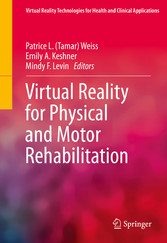Suchen und Finden
Virtual Reality for Physical and Motor Rehabilitation
While virtual reality (VR) has influenced fields as varied as gaming, archaeology and the visual arts, some of its most promising applications come from the health sector. Particularly encouraging are the many uses of VR in supporting the recovery of motor skills following accident or illness.
Virtual Reality for Physical and Motor Rehabilitation reviews two decades of progress and anticipates advances to come. It offers current research on the capacity of VR to evaluate, address, and reduce motor skill limitations and the use of VR to support motor and sensorimotor function, from the most basic to the most sophisticated skill levels. Expert scientists and clinicians explain how the brain organizes motor behavior, relate therapeutic objectives to client goals and differentiate among VR platforms in engaging the production of movement and balance. On the practical side, contributors demonstrate that VR complements existing therapies across various conditions such as neurodegenerative diseases, traumatic brain injury and stroke. Included among the topics:
- Neuroplasticity and virtual reality.
- Vision and perception in virtual reality.
- Sensorimotor recalibration in virtual environments.
- Rehabilitative applications using VR for residual impairments following stroke.
- VR reveals mechanisms of balance and locomotor impairments.
- Applications of VR technologies for childhood disabilities.
A resource of great immediate and future utility, Virtual Reality for Physical and Motor Rehabilitation distills a dynamic field to aid the work of neuropsychologists, rehabilitation specialists (including physical, speech, vocational and occupational therapists), and neurologists.
Patrice L. (Tamar) Weiss, Ph.D., is an occupational therapist with a M.Sc. degree in kinesiology and a Ph.D. degree in physiology and biomedical engineering. In 2001, she founded the Laboratory for Innovations in Rehabilitation Technology (LIRT) at the University of Haifa where she and her team develop and evaluate novel virtual environments, haptic interfaces and co-located technologies to explore the effect of individual and collaborative rehabilitation. Dr. Weiss' responsibilities include supervision of all aspects related to technology development and implementation. She has authored more than 100 peer-reviewed journal articles.
Alle Preise verstehen sich inklusive der gesetzlichen MwSt.







